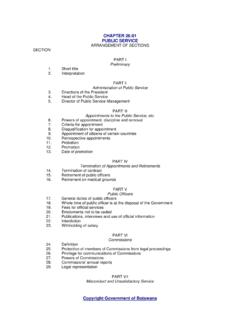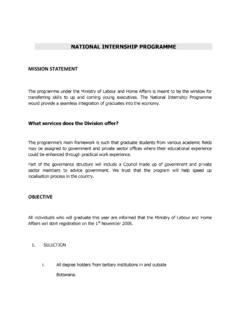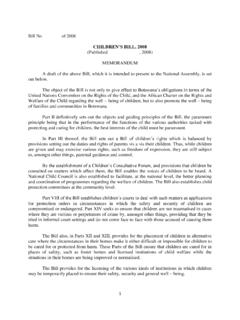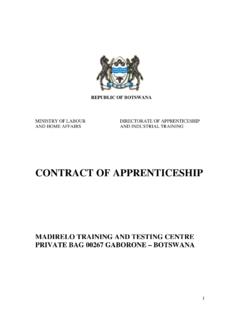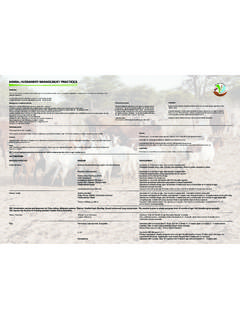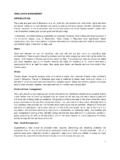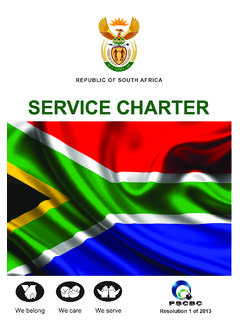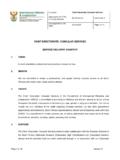Transcription of THE PUBLIC SERVICE CHARTER to them - Government portal
1 REPUBLIC OF BOTSWANA THE PUBLIC SERVICE CHARTER The Constitution of Botswana provides the legal foundation of the Republic, while the PUBLIC SERVICE provides its administrative foundation. Elections may pass, and political power may ebb and flow, but the PUBLIC SERVICE stands firm. Career Officers, serving the Government of the day without fear or favour, provide the continuity that is essential for stability and PUBLIC confidence. This PUBLIC SERVICE CHARTER sets out the basic principles of PUBLIC SERVICE , by which Officers are guided, both in their relations with each other and in their dealings with the PUBLIC which they serve. It is the application of these principles over the years which has fostered a proud tradition of PUBLIC SERVICE , that every Officer is expected to uphold.
2 The Eight Principles which chart the course of PUBLIC SERVICE are set out hereunder: A. REGARD FOR THE PUBLIC INTEREST The PUBLIC Officer is a servant to the PUBLIC , and his conduct must be characterised by courtesy, humility, respect for every person, regardless of station in life, and regard for the PUBLIC interest. Broadly speaking, the PUBLIC interest demands respect for the law and immediate compliance with Court Orders, adherence to the principles of natural justice, full consideration of both long-term and short-term effects of administrative action, adherence to previous commitments, including international obligations, avoidance of personal interests, and the consideration of all matters relevant to any issue.
3 B. NEUTRALITY The principle of neutrality encompasses not only political neutrality, but also fairness to fellow Officers and to the PUBLIC , and equality of treatment. Political neutrality demands that PUBLIC Officers give of their best regardless of the Government in power. It is the function of politicians to attack or defend policies. It is the function of PUBLIC servants to understand these, to explain them to the PUBLIC , and to implement them on behalf of the Government . Equality demands fair and equal treatment of all persons without discrimination on the grounds of religion, gender, status, place of origin, tribe, colour or religious affiliation. C. ACCOUNTABILITY Cabinet Ministers are politically accountable to the PUBLIC for the successes or failures of the Ministries they supervise.
4 Permanent Secretaries are administratively accountable to the PUBLIC for the performance of their Ministries. Every PUBLIC Officer is, however, accountable for the due performance of his duties and for the general successes and failures of those he supervises. Accountability carries with it the right to share the credit for successes of the Ministry, the Department, or the PUBLIC Officers themselves, but also the responsibility to share or shoulder the blame for their failures. PUBLIC accountability demands that Officers should freely and promptly admit and correct their mistakes or failures. D. TRANSPARENCY The principle of transparency dictates that members of the PUBLIC are entitled to have access to non-confidential information on the operation and activities of the PUBLIC SERVICE .
5 Those interested in administrative decisions or actions are entitled to be heard before decisions adverse to them are made, and to be informed of the reasons for such decisions and of any avenues of appeal which may be open to them . This applies equally to members of the PUBLIC and to PUBLIC Officers. Transparency does not, however, entitle PUBLIC Officers to breach their normal duty of confidentiality under the PUBLIC SERVICE Act, nor does it entitle members of the PUBLIC to have access to private information concerning others which is to be found in PUBLIC SERVICE files. Transparency demands that where possible full information on matters of PUBLIC interest should be made available by PUBLIC Officers authorised to do so to the press and to the PUBLIC at large.
6 Members of the PUBLIC should also have free access to PUBLIC Officers at all levels. Finally, it is a requirement of the principle of transparency that user groups and interested sections of the PUBLIC should be consulted in advance, when laws or decisions affecting their well-being are contemplated. E. FREEDOM FROM CORRUPTION PUBLIC confidence in the PUBLIC SERVICE requires that the behaviour of all Officers must be above reproach. Corruption comes in many guises, and once it takes root, it is extremely difficult to eradicate. Bribery consists in the giving or receiving of improper benefits in relation to the duties of PUBLIC Officers. Rewards or inducements may include cash bribes, free participation in businesses, sexual favours, improper promotions or appointments, gifts in kind of goods and services , free holidays, and excessive entertainment.
7 PUBLIC Officers are required not only to be on their guard against corruption, abuse of office and influence peddling in all its forms, but actively to participate in the fight against corruption by promptly reporting all improper activities and by helping to bring offenders to justice. Where the line is blurred between what is proper and what is improper, the safe route is always to be chosen. F. CONTINUITY The PUBLIC SERVICE is expected to operate in a regular and reliable manner, so that all the services which it offers to the PUBLIC , including decision-making services are provided on a continous basis. Situations of non-continuity where, for example, all key Officers in a field are away at once, so that SERVICE is interrupted or delayed, should not be permitted to occur.
8 Similarly, continuity of knowledge and experience should not be disturbed by block transfers or relocations of PUBLIC Officers. No Officer should assume a monopoly of information or keep his files in his head. It must be ensured that all information is available on file and is accessible to authorised Officers. Continuity also demands that powers be delegated when sole decision-makers are absent. Continuity in the PUBLIC SERVICE should be the guarantee of prompt and predictable SERVICE to members of the PUBLIC during all normal business hours. G. THE DUTY TO BE INFORMED Every PUBLIC Officer has the duty to inform himself and to keep himself informed of all matters pertinent to his SERVICE .
9 These include the aims and objectives of the Ministry, prevailing Government policies, the current National Development Plan, and the Training Plan and Schemes of SERVICE applicable to his Ministry. It is the responsibility of accounting Officers to keep all PUBLIC Officers subject to their authority appraised of Government policies as they are formulated. PUBLIC Officers must also be fully conversant with the PUBLIC SERVICE Act, the General Orders, Financial Instructions and Procedures, Supplies Regulations, Transport Regulations and all other rules governing PUBLIC Officers. It is only when they are armed with this knowledge that Officers are properly able to serve and inform the PUBLIC .
10 H. DUE DILIGENCE Members of the PUBLIC SERVICE are employed and paid by the tax-paying PUBLIC . They must adhere to the highest standards of diligence and efficiency as a matter of pride and national duty. That is why PUBLIC Officers are expected to give of their best whenever required to do so at any hour of the day and during any day of the year. Due diligence requires that the concerns, complaints and applications of members of the PUBLIC should be dealt with promptly and thoroughly. It requires that correspondence should be unfailingly and swiftly responded to. Finally, it requires that no Officer should permit his private interests to interfere with his duty of loyalty and continuous performance in the SERVICE of the nation.
